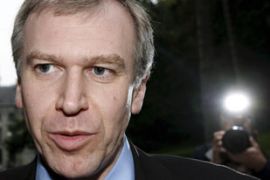Belgium political crisis continues
Christian Democrat leader tipped to head next government despite disagreements.

Published On 24 Aug 2007
Leterme’s CD&V party from Flanders, the northern Dutch-speaking region of Belgium, won the popular vote in the June election largely on a ticket of reform that would devolve more power to regional governments, something French speakers opposed.
Even if he does lead the next government, commentators said both sides would have to move into the middle ground.
Much debated reform
Commentators said on Friday that Leterme’s likely coalition would involve much-debated reform that would devolve power to regional governments.
French-speaking commentators also said there was no alternative to Leterme, all the while flagging Didier Reynders, the outgoing finance minister, as a possible prime ministerial candidate.
Peter Vandermeersch, a columnist for the Flemish daily De Standaard, wrote: “Everyone – Flemish and French speakers – has an interest in having a reasonable dialogue. If not, radicalisation looms, mostly on the Flemish side.
“Whoever continues to refuse a far-reaching devolution could well be preparing the ground for separatism.”
Separatism talk
While newspapers in Belgium have been rife in the past few days with talk of the country breaking up, commentators said that was an unlikely scenario.
Carl Devos, political scientist at the University of Ghent, said: “There is no majority even in Flanders on the splitting of the country.”
Beatrice Delvaux, editor-in-chief of national Francophone daily Le Soir, said: “[Leterme] has been reinforced by the crisis and legitimised in the eyes of the Flemish.
“It is very likely that he will be the next prime minister … It would be very difficult to have a Francophone prime minister.”
Source: News Agencies